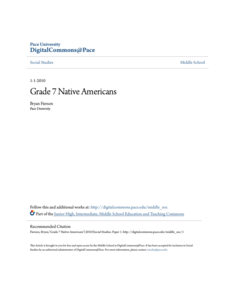US Institute of Peace
Responding to Conflict: Active Listening
Did I hear you right? You need a great lesson plan on active listening? Through large- and small-group activities, learners differentiate between poor and excellent listening skills. The resource, 7th in a series of 15, focuses on active...
New York State Education Department
TASC Transition Curriculum: Workshop 5
Are video games sports? Pupils investigate this question as well as various nonfiction selections to learn more about claims and the support that defines them. All of the selections mimic the rigor on state tests and encourage close...
New York State Education Department
TASC Transition Curriculum: Workshop 1
Work out your core, Common Core State Standards, through the first workshop in a series of 15 designed for educators. Inquiry-based activities designed for all content areas and grade levels explore the shifts to new standards,...
EngageNY
TASC Transition Curriculum: Workshop 12
How can opinions slant facts? Workshop participants learn how to examine primary and secondary sources and identify the author's point of view. They also examine how visual art impacts the meaning and rhetoric of sources. Full of...
Newseum
Editorials and Opinion Articles
Reading the news is fun, and that's a fact! With the lesson plan, scholars differentiate between fact and opinion as they read editorial articles. They complete a worksheet to analyze the information before writing their own editorials...
Pace University
Publishing Writing
Scholars become familiar with tagline literature with the help of the story, Alexander and the Horrible, No Good, Very Bad, Terrible Day by Judith Viort. After a read-aloud and whole-class discussion, leveled groups complete...
Pace University
The Iroquois
During the early 1500s, parts of modern-day New York were inhabited by Eastern Woodland Native Americans. To learn about the daily life, value, and traditions of these tribes, fourth graders research the Iroquois. Groups select...
Pace University
Native Americans
Introduce middle schoolers to the First Nations that inhabited the Northeast during the Age of Exploration with a series of activities designed for differentiated groups.
Pace University
Urban Communities
Urban communities are the focus of a series of lessons created to meet specific needs using differentiated instruction. A pre-assessment designates scholars into three groups based on their ability level. Small groups take part in...
Pace University
Volume and Capacity
Differentiated instruction through leveled learning contracts boosts scholars' knowledge of volume and capacity. Participants split into three groups based on ability and interest before choosing three activities from their learning...
Pace University
Grades 9-10 Algebra: Graphic Quadratics on the Coordinate Plane
Find quadratics in the world. Learners select ways to compare and contrast linear and quadratic functions and how to demonstrate knowledge of parabolas in the world. Teachers assign a third task challenging individuals to find equations...
Pace University
Grades 7-8 Mean, Median, and Mode
Take a central look at data. The differentiated lesson provides activities for pupils to calculate central tendencies. Scholars begin choosing three central tendency activities from a Tic-Tac-Toe board. Learners then choose from sports,...
Pace University
Grades 7-8 Independent and Dependent Variables
It all depends upon the independence. The differentiated instruction lesson introduces learners to independent and dependent variables. Using real-world situations, scholars gain a conceptual understanding of the difference between the...
Pace University
Grade 7 Earth Day Statistics with Circle and Bar Graphs
Take a tiered approach to studying waste. The lesson uses Earth Day to present differentiated instruction around using circle and bar graphs. Each group gets a cube based on their tiers and works collaboratively as well as individually...
Pace University
Grades 6-8 Ecology
Why are our national parks important? Scholars research the national parks and explore the basic ecology of these areas in a differentiated instruction unit on ecology. They learn about ecosystems, food chains, symbiosis, and biomes. The...
Pace University
Grades 9-12 Earth Science
How has Earth changed over time? Pupils explore the topic in a differentiated instruction unit on the geological time scale. After a pre-assessment to gauge knowledge, class members divide into groups based on their ability levels and...
Pace University
Grades 9-10 Energy Sources
Alternative energy sources are becoming increasingly important. Learners have the opportunity to explore alternative energy sources using a differentiated instruction unit. They group together based on ability levels, assign roles to...
Utah Education Network (UEN)
Utah Open Textbook: 5th Grade Science
How do Earth's changes affect humans? Pupils learn about physical and chemical changes on Earth and how they lead to erosion, earthquakes, and volcanoes. Using the text, they also explore the concepts of electricity and magnetism by...
Utah Education Network (UEN)
Utah Open Textbook: 3rd Grade Science
How do we interact with Earth? Scholars learn about the sun, Earth, moon, forces, gravity, and heat sources by reading a text and performing hands-on demonstrations. They also differentiate between living and non-living things using...
PBS
Stereotypes vs. Statistics (Grades 4-8)
Stereotypes can be painful if they are used to discriminate against others. Statistics, however, can be helpful in dispelling myths propagated by stereotypes. Using a thoughtful lesson plan, scholars complete graphic organizers...
College Board
2006 AP® Calculus BC Free-Response Questions Form B
Go a little deeper. Learners use the released 2006 AP® Calculus BC free-response questions to review for the BC test, which covers content from Calculus AB and Calculus BC. Topics include volumes of revolution, particle motion,...
Purdue University
Coloration Exploration
Finding an animal in nature can be like a game of hide and seek. A thorough lesson explores different coloration strategies of animals. Pupils complete look-and-find puzzles and coloring sheets to differentiate between different types of...
Curated OER
Regents High School Examination: Living Environment 2009
Emerging ecologists need a full understanding of life, from the inner workings of a cell to the complex relationships among organisms. This examination is meant to assess high schoolers after an entire year course on the living...
Curated OER
Regents High School Examination: Living Environment 2007
Environmental science enthusiasts show what they know at the end of the year by taking this full-fledged final exam. They answer multiple choice, graph interpretation, and essay analysys questions, 73 of them in all. Topics range from...
Other popular searches
- Cellular Differentiation
- Cell Differentiation
- Implicit Differentiation
- Genetic Differentiation
- Differentiation and Math
- Anti Differentiation
- Differentiation Strategies
- Differentiation Rule
- Differentiation Lesson Plans
- Logarithmic Differentiation
- Differentiation Component
- Writing Differentiation























